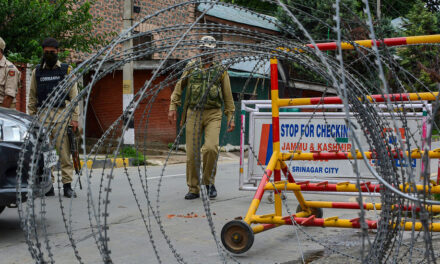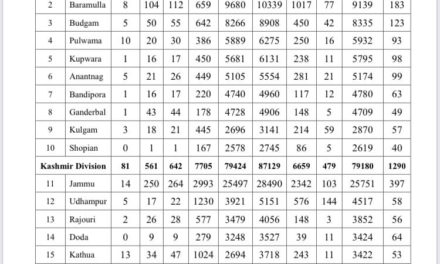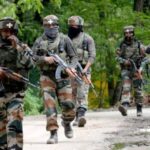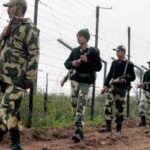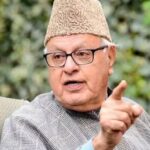![]()
KNZ NEWS DESK
Article 35A allows the Jammu and Kashmir legislature to define the list of ‘permanent residents’ of the state. Only permanent residents are eligible for:-
Employment in State Govt. Jobs,
Own permanent Land and property,
Vote in State legislative assembly elections
Eligible for special scholorships etc
It is added to the Constitution through a Presidential Order, i.e., The Constitution (Application to Jammu and Kashmir) Order, 1954 – issued by the President of India, “in exercise of the powers conferred by” clause (1) of Article 370 of the Constitution, with the concurrence of the Government of the State of Jammu and Kashmir.
The Jammu and Kashmir Constitution, which was adopted on November 17, 1956, defined a Permanent Resident (PR) of the state as a person who was a state subject on May 14, 1954, or who has been a resident of the state for 10 years, and has “lawfully acquired immovable property in the state!
Q.What is the intension of Sangh parivar and other indians who support this move?
The objective is to make Article 370 redundant to open the sluice gates for a demographic transformation of the State especially Valley by settling people from outside the state to change its muslim majority character and as a solution to the Kashmir issue.In India the lust for uniformity possesses communal-minded majoritarians
Q. Background of Article 35 A?
Prior to 1947, Jammu and Kashmir was a princely state whose people were “state subjects”, not British colonial subjects.The political movements in the state in the early 20th century led to the emergence of “hereditary state subject” as a political identity for the State’s peoples, and the legal provisions for the recognition of the status were enacted by the Maharaja of Jammu and Kashmir between 1912 and 1932. The 1927 Hereditary State Subject Order granted to the state subjects the right to government office and the right to land use and ownership, which were not available to non-state subjects.
It is based on the Maharaja’s Notification of 20 April 1927 which was issued at the instance of Kashmiri Pandits who feared an influx of people from Punjab to dominate administration and services.
Following the accession of Jammu and Kashmir to the Indian Union on 26 October 1947, The Maharaja ceded control over defence, external affairs and communications (the ‘ceded subjects’) to the Government of India . The Article 370 of the Constitution of India and the concomitant Constitutional Order of 1950 formalised this relationship. Discussions for furthering the relationship between the State and the Union continued, culminating in the 1952 Delhi Agreement, whereby the governments of the State and the Union agreed that Indian citizenship would be extended to all the residents of the state but the state would be empowered to legislate over the rights and privileges of the state subjects, who would now be called permanent residents. Following the adoption of the provisions of the Delhi Agreement by the Constituent Assembly of Jammu and Kashmir, the President of India issued The Constitution (Application to Jammu and Kashmir) Order, 1954, through which Indian citizenship was extended to the residents of the state, and simultaneously the Article 35A was inserted into the Indian constitution enabling the State legislature to define the privileges of the permanent residents.
Q. What is the petitioner’s contention?
Petitioners demand that Article be struck down as it was passed by President bypassing the parliament, whereas it was supposed to be constitutional amendment passed by parliament in accordance with article 368. Hence it is unconstitutional. Besides it reeks of emotive politics, factual errors of the crassest kind, and far-fetched argument which are manifestly absurd
Q. J&K Govt. Reply ?
State Govt. said the apex court had already dealt with the President’s 1954 order which allowed only the permanent residents of J&K to buy and sale the immovable properties, getting government jobs and voting rights there and restrained others.
It submitted that since Article 370 as enacted and amended remained in the Constitution as an integral part thereof and since the presidential order of 1954 has been recognised and acted on, as valid, ever since its promulgation, and when challenged, it was rejected by the two Constitution benches of the Supreme Court and sought dismissal of the petition.The President has power to alter, amend, vary or add a provision to the Constitution of India for its application to the state of J&K vide presidential order issued under Article 370.
Q. Opinion of Legal and Constitutional Experts?
A.G Noorani:- “Article 35A is beyond challenge”
“Parliament of India has no Legislative Competence to make laws in respect of J&K State subjects/citizens as defined by law and under Section-6 of the Constitution of J&K in respect of their immoveable properties.It is the State in terms of the section 5 of the Constitution of J&K, which has the absolute sovereign power to legislate laws touching the rights of its State subjects/citizens qua their immoveable properties.
historian Srinath Raghavan has written:
“…the article [35A] does not by itself confer any right on J&K state subjects. The Instrument of Accession signed by the Maharaja of Kashmir in October 1947 specified only three subjects for accession: foreign affairs, defence and communications. In July 1949, Sheikh Abdullah and three colleagues joined the Indian Constituent Assembly and negotiated over the next five months the future relationship of Kashmir with India.
This led to the adoption of Article 370, which restricted the Union’s legislative power over Kashmir to the three subjects in the Instrument of Accession. To extend other provisions of the Indian Constitution, the Union government would have to issue a Presidential Order to which state government’s prior concurrence was necessary. Further, this concurrence would have to be upheld by the constituent assembly of Kashmir, so that the provisions would be reflected in the state’s constitution. This implied that once Kashmir’s constituent assembly framed the state’s constitution and dissolved, there could be no further extension of the Union’s legislative power. This was the core of J&K’s autonomy.
Following another set of negotiations in 1952 between New Delhi and Srinagar—known as the Delhi Agreement—several other provisions of the Indian constitution were extended to J&K via a Presidential Order in 1954. Among other things, this order empowered the state legislature to regulate the rights of permanent residents. These were subsequently defined in the J&K constitution of 1956. Article 35A of the Indian constitution merely clarifies the different status of J&K in this regard. Questioning the validity of this Article has no bearing on the rights of state subjects. Nor can the Presidential Order of 1954 be questioned without questioning the validity of other provisions of the Indian constitution it extended to J&K. What’s more, such orders have periodically been used to amend the state’s constitution.”
J&K High Court Judgement:-“Article 35(A) which has been applied to the State of J&K, clarifies the already existing constitutional and legal position and does not extend something new to state.”
“This provision clears the constitutional relationship between people of rest of country with people of J&K. The citizens of State of Jammu and Kashmir have their own constitution and their sovereign character which cannot be challenged, altered or abridged,”
Q. Reaction of Politicians?
Mehbooba Mufti CM :-“Who is doing it? Why are they doing it? (challenging the Article 35A). Let me tell you that my party and other parties who carry the national flag there (in Jammu and Kashmir) despite all risks… I have no doubt in saying that there will be no one to hold it (if the article is diluted),”
Omar Abdullah :-state’s accession to the Indian Union and its special status are “two sides of the same coin” and “if there is debate on (the legality) of the Article, you will have to debate the accession itself”.
Q. People’s reaction?
People across all regions and sub regions of J&K State oppose tooth and nail any move to hurt the special status and priveleges of people notwithstanding any other differences on the basis of region, religion , caste , politics and ideology. No doubt there are some people fielded by Sangh parivar to subscribe to such demands without any application of mind blinded by right wing propaganda, communal passions and political and monetary benefits.They donot even represent Jammu city and falsely claim to represent Jammu region which extends from Kishtwar Doda to Poonch Rajouri upto Banihal, the people of these districts are unimanous with people of Kashmir region and with those of Kargil and Leh in defending own rights and honour
Article 370 and Article 35A is our minimum right and part of bargain with Indian Union and we will not tolerate any attempt to fiddle with it.



